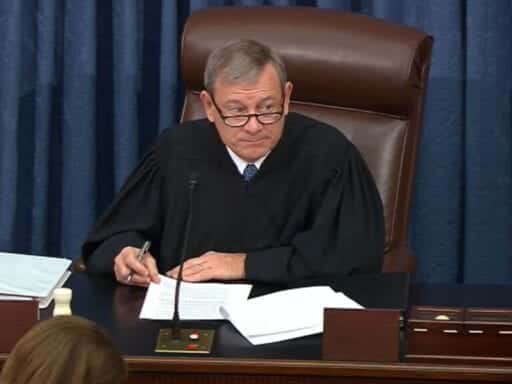He’s said he won’t read questions attempting to out the whistleblower.
Chief Justice John Roberts on Thursday refused to read a question from Sen. Rand Paul that appeared intended to out the whistleblower whose complaint eventually led to the impeachment investigation.
“The presiding officer declines to read the question as submitted,” said Roberts, after Paul offered the written question.
Paul’s inquiry, according to tweets he later posted, focused on the relationship between a staffer at the House Intelligence Committee and someone he may have worked with at the National Security Council, naming two specific individuals. He went on to add that he had no “independent information” about who the whistleblower was.
“I think this is an important question, one that deserves to be asked. It makes no reference to anybody who may or may not be a whistleblower,” Paul told reporters at a press briefing. One of the names he mentions, however, has been floated by some conservative publications as the potential whistleblower.
It’s the second time in the Senate’s two days of questioning that this scenario has played out; on Wednesday, Roberts told lawmakers that he would not read questions that could include the identity of a whistleblower, seemingly dismissing a submission from Paul, according to Politico.
Paul is among the members of the GOP who’ve been eager to use the focus on the whistleblower to divert attention from the abuse of power Trump is charged with committing. “Do your job and print his name!” Paul yelled at the press during a rally last fall.
In the months since the impeachment inquiry has been underway, Republicans, spurred by Trump himself, have sought to question the credibility of the whistleblower in order to undercut the allegations that have been raised against the president.
The whistleblower first raised concerns about a July 25 call between Ukrainian President Volodymyr Zelensky and President Trump that focused on investigations into the Bidens via a complaint that was shared with the intelligence community Inspector General Michael Atkinson last summer.
Paul has been one of the senators most focused on unearthing the whistleblower’s identity, which some lawmakers have argued is important because it would explain potential biases that the person has.
Other Democrats and Republicans, meanwhile, have argued that protecting the whistleblower’s anonymity is vital to ensure that people feel able to come forward when they observe potential wrongdoing in the government. Exposing the whistleblower, who is a member of the intelligence community, could also put this person at risk of professional retribution and other potential threats.
While current whistleblower laws lay out protections for individuals to come forward, they provide a limited shield if these people wind getting exposed.
House managers have emphasized, too, that the identity of the whistleblower isn’t important — the allegations the person raised have been corroborated by other sources including a summary that the White House released of the July 25 call, which shows Trump asking for investigations into the Bidens.
Because of Roberts’s opposition, Paul wasn’t able to carry out his stunt in the Senate on Thursday and had to take the antics to Twitter.
Author: Li Zhou
Read More



